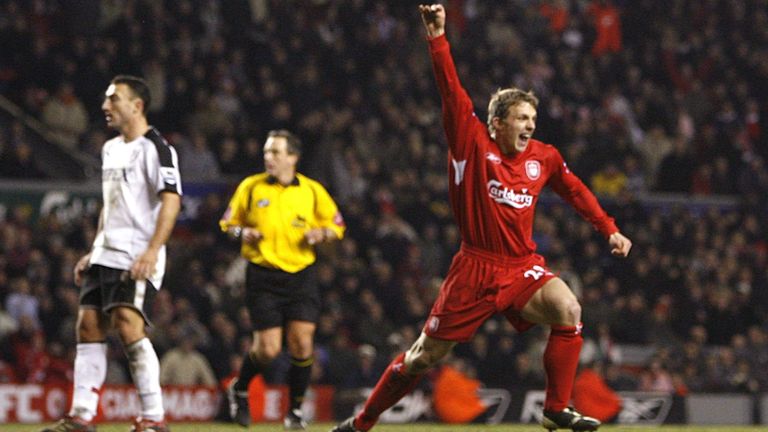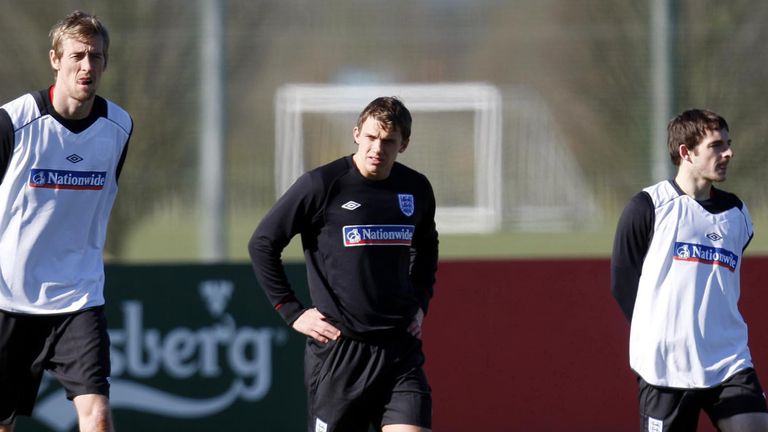“I just felt lost. I was thinking, where’s life going now? Where’s it going to take you to?”
Content warning: This article contains discussion around feelings of depression and suicide.
Former Liverpool, Aston Villa and England defender Stephen Warnock has opened up on how the struggle of ending his professional career left him contemplating his own life – until a chance meeting with a friend-turned-therapist began to turn the dial.
Warnock made more than 550 appearances for 10 clubs across 16 seasons, but speaking to Sky Sports as part of the Real Talk series, he revealed how his spiral started as he began falling out of love with the game and felt like his career had been a failure by the time he reached retirement.
“I felt like I was getting frustrated with football,” he said. “I’d played in the Premier League, then you slowly start to drop down. It becomes difficult, and that may sound a bit elitist or snobby but I just lost the buzz for it.
“I felt I wasn’t playing the way I wanted to, I wasn’t dieting the way I should. I probably wasn’t as a focused as I was, because I couldn’t get to the top again. I felt down, it depressed me.
“Now I look back at it and think wow, I was massively depressed for years. I retired at 35. I probably retired mentally at 31.”
Financial pressures brought on by what Warnock calls an “ill-advised” investment suggestion from his financial advisor probably extended the left-back’s professional career – but not for the reasons he would have wanted.
The now 42-year-old believes the financial advice, coupled with the harsh reality of retirement hitting home, created a perfect storm which drove him towards his darkest moments.
“I didn’t sleep properly for six years off the back of that [financial advice]. I was going back into training every morning on maybe three hours’ sleep,” Warnock said.
“Head touches the pillow, and I’m constantly thinking about how I get out of this. I look back and think money’s not everything. I wish I had just gone, ‘I’ve had a great run, I’ve lost the love for it, I’m going to find something else that makes me happy’.
“I looked back on my career and thought I was a failure. I thought I’d had a terrible career. Going to Liverpool, then going to Blackburn, to Aston Villa, then to Leeds and I just continued to go down. I always remember thinking I’d let myself down there.
“After you retire, I think people come out [of football] and just think life’s going to be okay. But it’s about what’s going to give you that buzz, what’s going to give you that excitement in your life. If you find that quickly, you’re okay – but you’ve got to find it.
“The one thing I liken this to is that football’s like the army – it’s regimented. You wear this, turn up at this time, eat this, report whenever, and you’re told where to be, when and what to be. But when you come out and lose that structure, it’s so difficult to replace.”
Warnock ended up losing his marriage and, for a period, contact with his children as he searched for a way to feel happy again, and found what would later provide that spark in the unlikeliest of places – Liverpool Lime Street Station.
It was there he bumped into an old friend who was training to be a counsellor. His advice to find a way to “be content” felt flippant at the time, but once it had sunk in months later, proved to be an important moment in Warnock’s life.
“I didn’t know what he meant when he first said it,” said Warnock. “It must’ve been about eight or nine months later I rang him, and he said he’d been waiting for that phone call for ages.
“He told me I looked a mess on TV, and sounded it – and he said he’d make me feel better within two weeks. I dug deep, there were a lot of tears, there was a lot of honesty.
“I remember coming off that call, and thinking I felt so different within one session. I messaged him after it and asked when we could have the next one. It was like a fix, I needed it. He’d give me homework to do, and the more homework I was doing and thinking about things, working on things, the better I felt. Constantly.
“I’d contemplated taking my own life at one stage. I was in so much of a rut, I just thought I was done until I phoned him. I tell him all the time he saved my life.
“Then I started engaging more with my kids, they could notice a difference in me, and I started to get a sense of looking back on my career and not being disappointed in it. It put a positive spin on it, made me realised what I’d achieved in my career.
“I spoke to him once and he said he’d watched me on TV and my voice sounded different, my body looked different in the way I was sitting, I looked confident in the way I was. And I felt so proud, because I knew how much I’d been through. It was one of the best moments of my life.”
If you have been affected by any of the themes raised in this article, you can contact The Samaritans for free by calling 116 123 in the UK.
Follow Real Talk on Sky Sports News’ digital and social channels and watch the extended interviews on Sky Sports News, YouTube and on demand.
You can also download the podcast on Spotify and Apple, where you can listen to all the interviews and take a closer look at the meaningful conversations with an expert.
Ad content | Stream Sky Sports on NOW
Stream Sky Sports live with no contract on a Month or Day membership on NOW. Instant access to live action from the Premier League and EFL, plus darts, cricket, tennis, golf and so much more.
Get Sky Sports on WhatsApp
You can now start receiving messages and alerts for the latest breaking sports news, analysis, in-depth features and videos from our dedicated WhatsApp channel! Find out more here




























+ There are no comments
Add yours